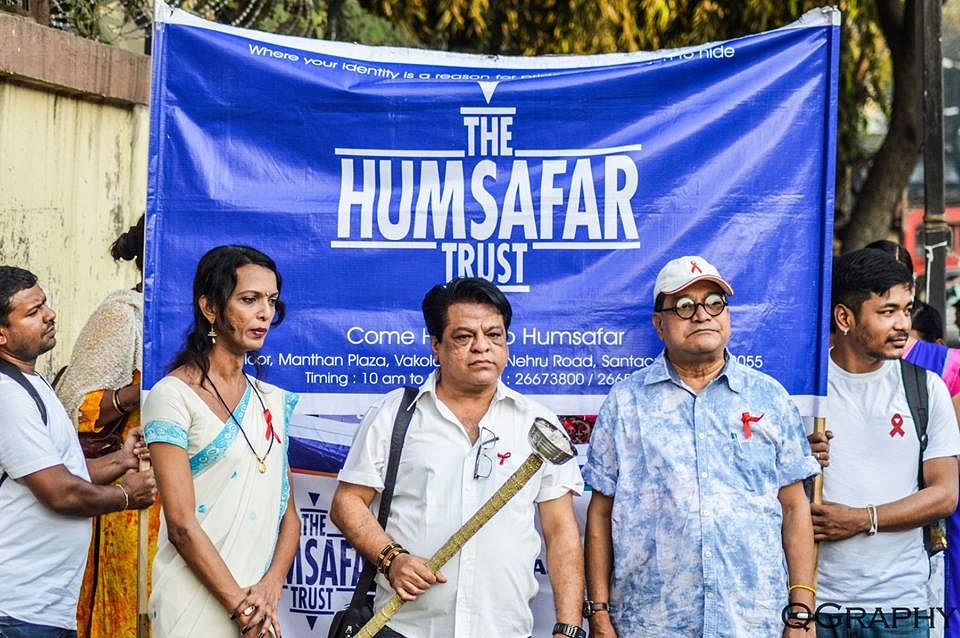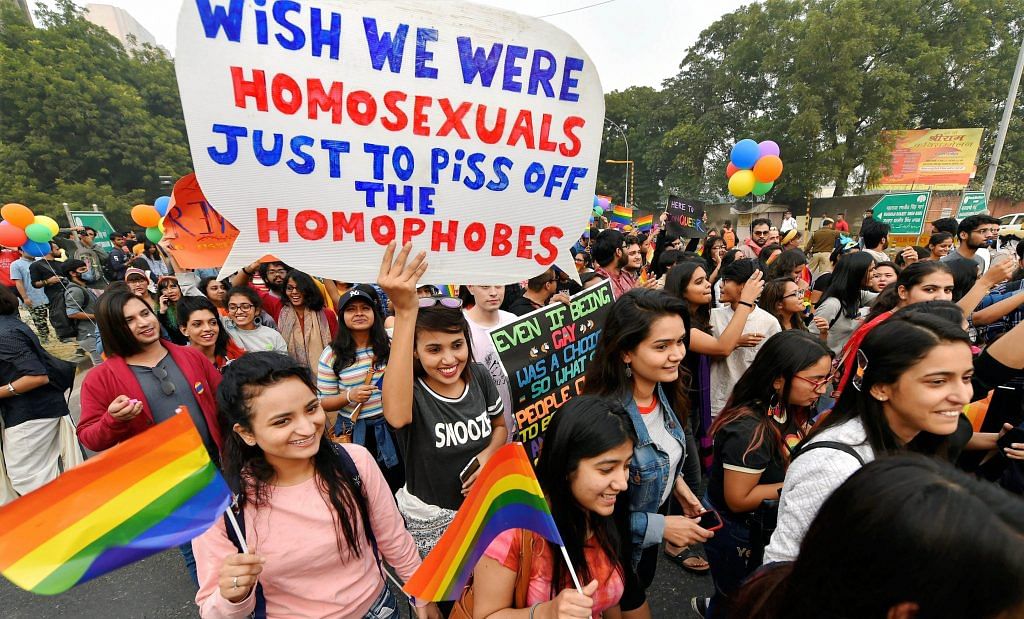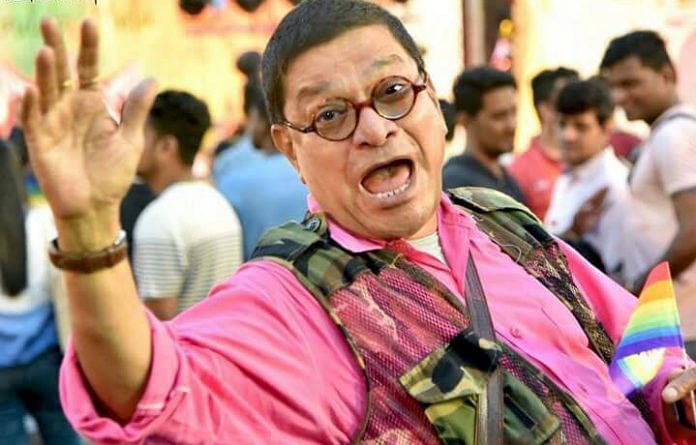A bundle of contradictions, Ashok Row Kavi backs PM Modi, doesn’t endorse separate Muslim, Dalit queer fights, all the while advocating for gay rights.
New Delhi: They call him Amma, ‘the mother of the gay community’, and unlike other ‘mothers’ in this country, he says, it’s a title he’s earned.
Ashok Row Kavi is the first man to publicly come out as gay in India way back in 1984, and in the over 30 years since, his life has been a rollercoaster of controversy that eventually brought him to the doorstep of the Supreme Court in 2018.
Row Kavi, who founded the Mumbai-based LGBT rights NGO Humsafar Trust in 1994, is one of the many who have petitioned for the removal of Section 377, which criminalises homosexuality.
As arguments concluded in the Supreme Court Tuesday, the five-judge bench reserved its verdict. Row Kavi, India’s oldest and most vocal gay rights activist, is optimistic — he believes “it is going to go our way”.
He has been slapped in the face by Saif Ali Khan, got Nikki Bedi’s talk show kicked off the air by Star TV in 1995, and been taken to court by the RSS. But the 71-year-old’s life is full of contradictions — he is an unapologetic right-wing Hindu who supports Narendra Modi.
“The BJP and Modi mind you, are not the same thing. Modi is the great disruptor. And anyone who disrupts the current situation is a friend in my book,” Row Kavi tells ThePrint in an interview.
Hinduism meets homosexuality
Row Kavi relies on Hinduism to fight 377. It was during his training to be a monk in the Ramakrishna Math that Row Kavi came out as being gay to a senior monk, Swami Harshananda. The swami, whom Row Kavi considers to be a mentor, guided him to “help my people” in the world.
He says homophobic laws were brought by the British when they colonised India, and find their roots in the bible. “The Leviticus,” he says, “can never be changed.” According to Row Kavi, the fight is not against Hinduism at all, but one of repealing a Christian law in an otherwise inclusive Hindu Rashtra. He also criticises feminist groups that he alleges receive funding from “Christian missionaries”, and labels them “convenient lesbians.”
The mother of gay activism carries references to the scriptures, folklore, the Ramayana and Mahabharata, on his fingertips — always ready to be deployed in defence of “the inclusive nature” of his faith. “Even Rama was desired by both and men and women,” he says.
Row Kavi was born on 1 June, 1947, to parents who fled poverty in South India and sought asylum in what was then Bombay. Row Kavi, who believes Christianity to be the root of homophobic evil, was schooled in Bombay Scottish School, which has Christian affiliations.
Along with a diploma in religion and comparative theology from Ramakrishna, he also has a bachelors and masters in Chemistry from the University of Bombay. But the sciences didn’t hold Row Kavi for long, as he dropped out of college to pursue a career in journalism that spanned over 18 years.
Along with big names such as The Indian Express, The Week, and the Free Press Journal, Row Kavi also started India’s first men’s magazine with his friend Anthony Van Braband in 1971. Called Debonair, the magazine would become famous for its topless female centrefolds.
This, however, was just the start. Row Kavi’s quest to disrupt what he calls “neo-Christian prudishness” led him to his defining moment 13 years later. In 1984, at the age of 37, Row Kavi featured in an exclusive interview with Savvy magazine, in which he became the first Indian man to ever publicly declare his homosexuality.

“When I came out in ’84, they used to laugh at me, saying why are you people asking for rights. There has always been a hierarchy of rights, and gay rights is always at the end,” he recalls.
Row Kavi says it was then that he set out to create a space in which homosexuality was taken seriously. With the support of a liberal family, he founded Bombay Dost, India’s first LGBT magazine in 1990. Early editions looked more like newspapers, but were sold at premium prices of Rs 15 or more by dealers — an MRP that exceeded even the mainstream glossies such as Stardust. In 1995, a picture of a wet Akshay Kumar wearing a nath (nose-ring) appeared on the front page — the edition was sub-titled Akshay on Gays. Row Kavi had finally arrived in Bombay.
Queen of controversies
For all his advocacy of gay rights, Row Kavi’s spectrum of activism is a short one. The same breath with which he calls himself a midnight’s child is used to denounce activism by other minority communities, including Muslim queers.
His beliefs, and subsequently his activism, remain firmly rooted in his identity as an upper caste Hindu male, and he makes no apology for it. “Hinduism today is a huge umbrella of superstition and stupid beliefs but that’s only because people have forgotten what it really stood for. This is my house, these are my people, and I will fight among them. I will never give up on Hinduism,” he says.
An ardent advocate of free speech, he has often landed himself in trouble when he practices what he preaches. In 1995, he called Mahatma Gandhi a bast**rd baniya on Nikki Tonight, a talk show hosted by Nikki Bedi. Gandhi’s grandson filed a case of around Rs 50 crore against Star TV, forcing the show to shut down permanently.
In 1995, Row Kavi alleges that he was beaten up by actor Saif Ali Khan, who, he says, accused Row Kavi of mocking his mother’s acting on television. But according to Row Kavi, the real reason was because of his observations of the film ‘Main Khiladi Tu Anadi’ — Row says that he had said that Saif and Akshay were so much in love in the movie that it should have been an entry in the San Francisco gay and lesbian film festival.
In the 1970s, Row Kavi says that he was even threatened by the RSS with a court case, after he published an article advising Hindus to start eating beef. He recounts receiving a letter from the right-wing nationalist organisation demanding a retraction, and says that some members even approached his house asking whether he was a Muslim.
His close friends say that he has a “tendency to run head first into controversy,” and that they tend to draw a line between his public and private self.
The ‘right’ side of the revolution
Row Kavi’s religious inclinations, however, don’t entirely presuppose his political ideology. “I tell people I am on the extreme left of Mao and the extreme right of RSS,” Row Kavi says laughingly. When asked about the BJP, Row Kavi scoffs, calling them “a bunch of pr**ks, who are no less Neo-Christian than Mahatma Gandhi.”
Though Row Kavi says he has no problem with Muslims coming under the LGBT+ umbrella, he believes that a separate Muslim queer collective will only dilute the movement. “Now these queer Muslims are creating their groups because they say that their religion doesn’t permit homosexuality and Hindus hate them. Where will the activism go with such belief?” he questions. “If they are so concerned about the queer Muslims, why don’t they show interest in opening up space for people in Iran, Saudi, Pakistan and Bangladesh?” he adds.
With the rise of the internet, Row Kavi has now found a platform to voice his controversial beliefs with near impunity and to a wide audience — social media. His friends say he is addicted to Facebook and “would probably have meltdown if the internet stopped working for even a day.” His retweets reflect his strange mix of right-wing liberalism — focused on championing the liberation of homosexuals — while simultaneously highlighting the orthodoxy of Islam.
When the movie Fire created public outrage amongst the Shiv Sainiks in 1998, Row Kavi had written that ‘Shiv Sena activists are actually the Taliban who are falsely claiming to be Hindus’. According to him, Hinduism, unlike Christianity and Islam, does not view homosexuality as a religious sin.
A conservative Hindu fundamentalist, he has no time for those that aren’t fighting his fight. “The other rights are practicality a set of entitlements. There are scheduled castes, OBC, minority, and Muslim commissions. But is there a gay rights commission in this country?” he says. He makes sure, however, to clarify that all are welcome at Hamsafar Trust, and that he “doesn’t care if your c*** is Hindu or Muslim or RSS.”
Row Kavi has four partners at present, one of whom he says is a Muslim army-man. He claims that they often read the namaz together. For Row Kavi, the lines between personal and political are flexible at will, as in the same breath he also says that he is “not going to ally and say I’m going to stand with the Muslim processions, no, I don’t want to.” He goes on to add that “three of the most vicious petitioners, who are against us fighting 377, are three Christian groups. I will stand with my civilisation, and I will not have people demonising Hindus all the time.”
When it comes to what Row Kavi calls ‘the Delhi left-liberals,’ he has no patience for them or their pride. He talks almost competitively, citing the Delhi pride’s dwindling numbers versus Bombay’s growing strength. The left, according to him, “talk utter rubbish and do nothing.” He says that “they’re more concerned about getting to hold hands with your lover in public than fight based on facts and law. Their entire petition is one of victimhood.”

Hero and Villain
Ashok Row Kavi is loved and hated in equal measure. He has divided opinion along a variety of fault-lines, both within and outside the community.
The first time Vivek Anand, present director of the Humsafar Trust, saw Row Kavi was on television. “He was putting a condom on a banana on live TV and I knew this man was something else.”
Through their 24-year partnership, Anand talks of Row Kavi as a teacher, friend and mentor, without whom his own personal journey of coming out would be incomplete. “Ashok understood things, more perhaps than even I did at the time. It was after a conversation with him that I decided to come out to people close to me. Before that I was afraid to buy a copy of a men’s magazine because I was afraid the shopkeeper would find out I was gay,” Anand tells ThePrint.
Not everyone however, shares the same warm experiences. Queer activist Vikramaditya Sahai, one of the ‘Delhi left-liberals’ Row Kavi referred to by name, recalls a systematic smear campaign against Labia — a Mumbai-based lesbian and bisexual women and transperson collective — by gay men, including Row Kavi.
“They accused them of ‘politicising’ the space of pride, for bringing in other issues and critiquing the state. And eventually being the target of such slander was so exhausting and debilitating that these groups stopped seeing publicity like Kavi does,” Sahai tells ThePrint.
Sahai says the issue isn’t so much about Delhi vs Bombay, but rather about a certain section of people who want to dominate the discourse and dictate what the pride should look like. “For people like Row Kavi, the pride is an imagination of the cis-Hindu upper class, upper caste gay male, and all the other kinds of queer people don’t exist. These other queer communities (Dalits, women, Muslims) are politicising your pride by bringing their identities, while you get to be this pure, abstract figure because Modi is in power,” he says.




No leftwing / socialist/ secular queer person wants to associate with Humsafar more so because the organisation tries to be apolitical on numerous human-rights issues. No leftwing / socialist/ secular queer person is against advocacy to seek anti-discrimination laws against queer people but favourable laws wont solve discrimination meted out against queer people and to empathise some leftwing / socialist/ secular queer people like me and many want to build solidarity with the cause of kashmir, dalits, tribals, underemployment, unemployment, universal education & healthcare. Bahujan (hindu/ non-hindu OBCs/ Dalits/ Tribals form 85%) of India population and their discourse is inclusive and also anti-caste supremacy) any sane person would be comfortable with such an inclusive discourse but most Humsafar functionaries are not willing to accept this anti-caste/ anti-brahminical discourse because they are mostly tolerant of caste supremacy)
This must be the longest article by you.
I couldn’t put this book down! Took only two days for me to read. I just love with all the other books from this author and knew I shouldnt skip this one. Love the author who has a great way of making the reader sympathize with the storyline and a need to know how it ends up..I am a true fan! I also advise to read http://bit.ly/2mo36zm . Thank you P.S: I like this website.
Sec is given for procreation and it i not for entertainment or past time or even an ego booster. If one misuses it, it is said, one will be born as transgender or lesbian or gay. Karmaphal is the cause of being what we are.
What I don’t understand however in this article is the piece where some unknown gay person from Delhi decides to make a representation for LABIA – an LBT collective in Mumbai! Beats the purpose! Can’t LABIA represent themselves? Also to set the record straight , I believe they are still a part of the QAM collective, if they choose not to attend the meetings , it’s their call ! Hence a factual error in reporting and irresponsible journalism on part of Print
Nandita Singh and Nikhil Rampal, its a nicely written article, full marks on the verbiage and the grammer, but 5/10 on authenticity of the so called facts which you have mentioned. More points of reference while studying Ashok’s life and on the queer movemtn would have helped you not get into a controversy. I would say it is a good try on a smear campaign directed at Ashok, but sadly most of the us hetreos and queers know the truth. So try to be a responsible journalist next time.
What is the purpose of this article? Patting Kavi on the back even while kicking him in the arse, is okay, but there should be a thread tying all this together.
Ashok Row Kavi’s struggles against 377 on behalf of the LGBTQ community stems from an obvious need to help gay people that are vulnerable. There is too much to and fro-ing here. So he’s far-right, so what! So he is an upper-caste Hindu, so what! So his tongue runs away with him, so what? What is his goal? That’s what this article needed to wrap this piece up.